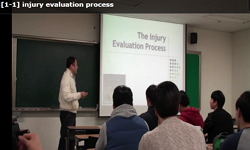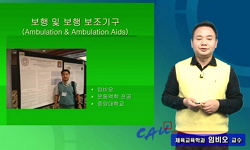Background: Traumatic spinal cord injury (SCI) is a tragic event that has a major impact on individuals and society as well as the healthcare system. The purpose of this study was to investigate the strength of association between surgical treatment t...
http://chineseinput.net/에서 pinyin(병음)방식으로 중국어를 변환할 수 있습니다.
변환된 중국어를 복사하여 사용하시면 됩니다.
- 中文 을 입력하시려면 zhongwen을 입력하시고 space를누르시면됩니다.
- 北京 을 입력하시려면 beijing을 입력하시고 space를 누르시면 됩니다.
https://www.riss.kr/link?id=A105935412
- 저자
- 발행기관
- 학술지명
- 권호사항
-
발행연도
2018
-
작성언어
English
- 주제어
-
등재정보
KCI등재,SCOPUS,SCIE
-
자료형태
학술저널
- 발행기관 URL
-
수록면
448-454(7쪽)
-
KCI 피인용횟수
2
- 제공처
-
0
상세조회 -
0
다운로드
부가정보
다국어 초록 (Multilingual Abstract)
Methods: Fifty-six patients with neurological impairment due to traumatic SCI were included in this study. From January 2013 to June 2017, all their medical records were reviewed. Initially, to identify the factors affecting the recovery of neurological deficit after an acute SCI, we performed univariate logistic regression analyses for various variables. Then, we performed a multivariate logistic regression analysis for variables that showed a p-value of < 0.2 in the univariate analyses. The Hosmer-Lemeshow test was used to determine the goodness of fit for the multivariate logistic regression model.
Results: In the univariate analysis on the strength of associations between various factors and neurological improvement, the following factors had a p-value of < 0.2: surgical timing (early, < 8 hours; late, 8–24 hours; p = 0.033), completeness of SCI (complete/ incomplete; p = 0.033), and smoking (p = 0.095). In the multivariate analysis, only two variables were significant: surgical timing (odds ratio [OR], 0.128; p = 0.004) and completeness of SCI (OR, 9.611; p = 0.009).
Conclusions: Early surgical decompression within 8 hours after traumatic SCI appeared to improve neurological recovery. Furthermore, incomplete SCI was more closely related to favorable neurological improvement than complete SCI. Therefore, we recommend early decompression as an effective treatment for traumatic SCI.
Background: Traumatic spinal cord injury (SCI) is a tragic event that has a major impact on individuals and society as well as the healthcare system. The purpose of this study was to investigate the strength of association between surgical treatment timing and neurological improvement.
Methods: Fifty-six patients with neurological impairment due to traumatic SCI were included in this study. From January 2013 to June 2017, all their medical records were reviewed. Initially, to identify the factors affecting the recovery of neurological deficit after an acute SCI, we performed univariate logistic regression analyses for various variables. Then, we performed a multivariate logistic regression analysis for variables that showed a p-value of < 0.2 in the univariate analyses. The Hosmer-Lemeshow test was used to determine the goodness of fit for the multivariate logistic regression model.
Results: In the univariate analysis on the strength of associations between various factors and neurological improvement, the following factors had a p-value of < 0.2: surgical timing (early, < 8 hours; late, 8–24 hours; p = 0.033), completeness of SCI (complete/ incomplete; p = 0.033), and smoking (p = 0.095). In the multivariate analysis, only two variables were significant: surgical timing (odds ratio [OR], 0.128; p = 0.004) and completeness of SCI (OR, 9.611; p = 0.009).
Conclusions: Early surgical decompression within 8 hours after traumatic SCI appeared to improve neurological recovery. Furthermore, incomplete SCI was more closely related to favorable neurological improvement than complete SCI. Therefore, we recommend early decompression as an effective treatment for traumatic SCI.
참고문헌 (Reference)
1 Cengiz SL, "Timing of thoracolomber spine stabilization in trauma patients; impact on neurological outcome and clinical course: a real prospective (RCT) randomized controlled study" 128 (128): 959-966, 2008
2 Chen Q, "Timing of surgical decompression for acute traumatic cervical spinal cord injury: a multicenter study" 22 (22): 61-68, 2012
3 El Tecle NE, "Timing of surgery in spinal cord injury" 41 (41): E995-E1004, 2016
4 Furlan JC, "Timing of decompressive surgery of spinal cord after traumatic spinal cord injury: an evidence-based examination of pre-clinical and clinical studies" 28 (28): 1371-1399, 2011
5 Norenberg MD, "The pathology of human spinal cord injury: defining the problems" 21 (21): 429-440, 2004
6 김영훈, "Spinal Cord Injury and Related Clinical Trials" 대한정형외과학회 9 (9): 1-9, 2017
7 Tator CH, "Review of treatment trials in human spinal cord injury: issues, difficulties, and recommendations" 59 (59): 957-982, 2006
8 Pointillart V, "Pharmacological therapy of spinal cord injury during the acute phase" 38 (38): 71-76, 2000
9 Delamarter RB, "Pathophysiology of spinal cord injury: recovery after immediate and delayed decompression" 77 (77): 1042-1049, 1995
10 Jug M, "Neurological recovery after traumatic cervical spinal cord injury is superior if surgical decompression and instrumented fusion are performed within 8 hours versus 8 to 24 hours after injury: a single center experience" 32 (32): 1385-1392, 2015
1 Cengiz SL, "Timing of thoracolomber spine stabilization in trauma patients; impact on neurological outcome and clinical course: a real prospective (RCT) randomized controlled study" 128 (128): 959-966, 2008
2 Chen Q, "Timing of surgical decompression for acute traumatic cervical spinal cord injury: a multicenter study" 22 (22): 61-68, 2012
3 El Tecle NE, "Timing of surgery in spinal cord injury" 41 (41): E995-E1004, 2016
4 Furlan JC, "Timing of decompressive surgery of spinal cord after traumatic spinal cord injury: an evidence-based examination of pre-clinical and clinical studies" 28 (28): 1371-1399, 2011
5 Norenberg MD, "The pathology of human spinal cord injury: defining the problems" 21 (21): 429-440, 2004
6 김영훈, "Spinal Cord Injury and Related Clinical Trials" 대한정형외과학회 9 (9): 1-9, 2017
7 Tator CH, "Review of treatment trials in human spinal cord injury: issues, difficulties, and recommendations" 59 (59): 957-982, 2006
8 Pointillart V, "Pharmacological therapy of spinal cord injury during the acute phase" 38 (38): 71-76, 2000
9 Delamarter RB, "Pathophysiology of spinal cord injury: recovery after immediate and delayed decompression" 77 (77): 1042-1049, 1995
10 Jug M, "Neurological recovery after traumatic cervical spinal cord injury is superior if surgical decompression and instrumented fusion are performed within 8 hours versus 8 to 24 hours after injury: a single center experience" 32 (32): 1385-1392, 2015
11 Clohisy JC, "Neurologic recovery associated with anterior decompression of spine fractures at the thoracolumbar junction (T12-L1)" 17 (17): S325-S330, 1992
12 Agrawal SK, "Mechanisms of secondary injury to spinal cord axons in vitro: role of Na+, Na(+)-K(+)-ATPase, the Na(+)-H+ exchanger, and the Na(+)-Ca2+ exchanger" 16 (16): 545-552, 1996
13 Liu JM, "Is urgent decompression superior to delayed surgery for traumatic spinal cord injury? A meta-analysis" 87 : 124-131, 2016
14 Wyndaele M, "Incidnce, prevalence and epidemiology of spinal cord injury: what learns a worldwide literature survey?" 44 (44): 523-529, 2006
15 Hakalo J, "Importance of early operative decompression of spinal cord after cervical spine injuries" 38 (38): 183-188, 2004
16 Maikos JT, "Immediate damage to the bloodspinal cord barrier due to mechanical trauma" 24 (24): 492-507, 2007
17 Fawcett JW, "Guidelines for the conduct of clinical trials for spinal cord injury as developed by the ICCP panel: spontaneous recovery after spinal cord injury and statistical power needed for therapeutic clinical trials" 45 (45): 190-205, 2007
18 Zariffa J, "Functional motor preservation below the level of injury in subjects with American Spinal Injury Association Impairment Scale grade A spinal cord injuries" 93 (93): 905-907, 2012
19 Pollard ME, "Factors associated with improved neurologic outcomes in patients with incomplete tetraplegia" 28 (28): 33-39, 2003
20 Carreon LY, "Early versus late stabilization of spine injuries: a systematic review" 36 (36): E727-E733, 2011
21 Fehlings MG, "Early versus delayed decompression for traumatic cervical spinal cord injury: results of the Surgical Timing in Acute Spinal Cord Injury Study (STASCIS)" 7 (7): e32037-, 2012
22 Krengel WF 3rd, "Early stabilization and decompression for incomplete paraplegia due to a thoracic-level spinal cord injury" 18 (18): 2080-2087, 1993
23 Asad Abbas, "Clinical Outcome in Patients with Early versus Delayed Decompression in Cervical Spine Trauma" 대한척추외과학회 8 (8): 427-434, 2014
24 Fehlings MG, "An evidence-based review of decompressive surgery in acute spinal cord injury: rationale, indications, and timing based on experimental and clinical studies" 91 (91): 1-11, 1999
25 Bracken MB, "Administration of methylprednisolone for 24 or 48 hours or tirilazad mesylate for 48 hours in the treatment of acute spinal cord injury: results of the Third National Acute Spinal Cord Injury Randomized Controlled Trial. National Acute Spinal Cord Injury Study" 277 (277): 1597-1604, 1997
26 Bracken MB, "A randomized, controlled trial of methylprednisolone or naloxone in the treatment of acute spinal-cord injury: results of the Second National Acute Spinal Cord Injury Study" 322 (322): 1405-1411, 1990
동일학술지(권/호) 다른 논문
-
- 대한정형외과학회
- 이영균
- 2018
- KCI등재,SCOPUS,SCIE
-
- 대한정형외과학회
- 유재성
- 2018
- KCI등재,SCOPUS,SCIE
-
- 대한정형외과학회
- 박형진
- 2018
- KCI등재,SCOPUS,SCIE
-
- 대한정형외과학회
- Emrah Caliskan
- 2018
- KCI등재,SCOPUS,SCIE
분석정보
인용정보 인용지수 설명보기
학술지 이력
| 연월일 | 이력구분 | 이력상세 | 등재구분 |
|---|---|---|---|
| 2024 | 평가예정 | 해외DB학술지평가 신청대상 (해외등재 학술지 평가) | |
| 2021-01-01 | 평가 | 등재학술지 선정 (해외등재 학술지 평가) |  |
| 2020-12-01 | 평가 | 등재 탈락 (해외등재 학술지 평가) | |
| 2020-04-14 | 학회명변경 | 영문명 : 미등록 -> The Korean Orthopaedic Association |  |
| 2013-10-01 | 평가 | 등재학술지 선정 (기타) |  |
| 2010-01-01 | 평가 | SCOPUS 등재 (신규평가) |  |
학술지 인용정보
| 기준연도 | WOS-KCI 통합IF(2년) | KCIF(2년) | KCIF(3년) |
|---|---|---|---|
| 2016 | 0.06 | 0.06 | 0.07 |
| KCIF(4년) | KCIF(5년) | 중심성지수(3년) | 즉시성지수 |
| 0.07 | 0.1 | 0.346 | 0.04 |






 KCI
KCI






